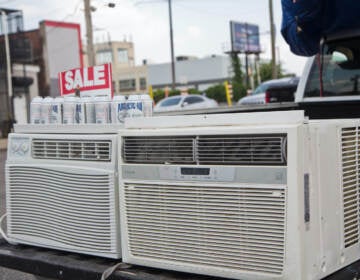Joe the Solar Guy: Can Philly green its poorest places?
Coming just five days before the inauguration of Barack Obama as the country’s first president to tout “green jobs” as a national priority, Thursday evening’s Urban Sustainability Forum, addressing “The Green Economy,” will be a well-timed event. Environistas from organizations based in Obamaland – Greencorps Chicago and the Chicago Department of Environment – will be on hand to talk about their community landscaping and job training programs.
“By providing workshops, plant materials, technical assistance and educational programs, Greencorps is able to improve local quality of life while also employing city residents,” say the folks at Town Square, part of the Center for Environmental Policy, a new initiative by The Academy of Natural Sciences, where Thursday’s program will be held starting at 6:30 p.m.
Combining environmentalist policy with urban jobs is the sweet spot for Van Jones, founding president of the group Green For All and a senior fellow with the Center for American Progress. (http://www.vanjones.net/page.php?pageid=3 ) He’s also a rock star of the movement who sees green infrastructure not only as a means of getting Americans back to work, but as a main deliverance from poverty for inner-city residents.
Jones was a guest at last year’s Urban Sustainability Forum, and since then, organizers say that more than “70 people representing 50 non-profits, government agencies, labor unions, universities and job-training entities have been working together as part of the Green Economy Task Force,” convened by the Sustainable Business Network of Greater Philadelphia. The network “has made tremendous steps forward in helping Philadelphia take advantage of the growth of green collar jobs.”
Jones, author of the recent book, “The Green Collar Economy: How One Solution Can Fix Our Two Biggest Problems,” was also the subject of a recent profile in The New Yorker by Elizabeth Kolbert. (Kolbert herself was a guest at “Re-imagining Cities: Urban Design After the Age of Oil,” a conference and exhibit in November at Penn that was sponsored by the Penn School of Design, the Penn Institute for Urban Research and the Rockefeller Foundation [ http://www.planphilly.com/node/4227 ].)
“Your goal has to be to get the greenest solutions to the poorest people,” Jones told Kolbert. ( http://www.newyorker.com/reporting/2009/01/12/090112fa_fact_kolbert ) “That’s the only goal that’s morally compelling enough to generate enough energy to pull this transition off. The challenge is making this an everybody movement, so your main icons are Joe Six-Pack – Joe the Plumber – becoming Joe the Solar Guy, or that kid on the street corner putting down his handgun, picking up a caulk gun.”
Kolbert’s piece on Jones is compelling, but no valentine. The complexities of the national economy, urban infrastructure, highways, racial matters and the realities of getting a green jobs bill passed are all discussed, along with Jones’s spotty record of effectiveness in past efforts. But overall, it is a portrait of a guy with a tremendous amount of green energy within just himself – an African-American who says Obama is not the first black president but the first green president, and who thinks of the word “disposability” in a human sense as well as material terms. He once headed up a program called “Green Jobs, Not Jail.”
In the article, Jones is quoted addressing a group in Boston:
“If we come together and get this done, we will have achieved something quite extraordinary. We will have achieved something greater than Barack Obama has. What gave him the audacity of hope? You did. Even when the government wasn’t interested in green buildings, even when your local city council didn’t know what you were talking about, you had the audacity to keep pushing anyway, to keep raising standards anyway, to keep trying to make a difference anyway. He saw that audacity in you.”
Another guest Thursday will be David Foster, president of The Blue-Green Alliance in Minneapolis, an initiative led by the United Steelworkers Union and the Sierra Club (the alliance was also mentioned in the Jones story).
Leanne Krueger-Braneky, executive director of the Sustainable Business Network, will moderate the event.
– Posted by Thomas J. Walsh.
Contact the reporter at www.ThomasJWalsh.info.
WHYY is your source for fact-based, in-depth journalism and information. As a nonprofit organization, we rely on financial support from readers like you. Please give today.






